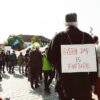
Austria’s newly crowned Eurovision champion, JJ (Johannes Pietsch), has ignited controversy across Europe and Israel after publicly calling for Israel to be banned from the 2026 Eurovision Song Contest in Vienna, citing the ongoing conflict in Gaza. The remarks, made in a post-victory interview with Spain’s El País, have drawn both international attention and pointed responses from Israeli commentators and the public.
JJ’s Comments and Eurovision’s Political Storm

JJ, who won Eurovision 2025 with his song “Wasted Love,” told El País: “It is very disappointing to see Israel still participating in the contest. I would like the next Eurovision to be held in Vienna and without Israel”. He further questioned the transparency of the contest’s voting system, describing the process as “very strange” and calling for reforms to ensure greater fairness.
JJ’s stance aligns with several European broadcasters and artists, as well as political leaders such as Spain’s Prime Minister Pedro Sánchez, who have argued that Israel’s participation contradicts Eurovision’s precedent of excluding countries involved in major conflicts, referencing Russia’s ban after its invasion of Ukraine. Pro-Palestinian groups and dozens of former Eurovision participants have also signed open letters urging the European Broadcasting Union (EBU) to exclude Israel.
Israeli Reactions: Sarcasm and Historical Irony
The Israeli public and media have responded with a mix of sarcasm and historical references. On social media, some Israeli mocked JJ’s stage name, suggesting it sounds like something “taken from Coco Melon,” a children’s cartoon, and questioned his authority to speak on such matters, saying, “He thinks he can have a say like a world-famous artist.” Others invoked a darkly ironic reference to Austria’s most infamous historical figure, noting, “We all know what an Austrian artist can do,” alluding to Adolf Hitler’s failed ambitions as a painter before becoming the architect of the Holocaust.
Members of the Israeli Eurovision delegation also noted that the Austrian team avoided them throughout the contest, describing the behavior as “very noticeable” but not as overt as the previous year’s shunning4. Israel’s public broadcaster, Kan, firmly rejected allegations of voting irregularities and defended the legitimacy of Israeli entrant Yuval Raphael’s strong public support, stating, “The public in Europe loves Yuval and the Israeli song”.
Broader Implications and Next Steps
The controversy has reignited debate over Eurovision’s role as a cultural event versus a political platform. The EBU has not yet announced any changes to eligibility rules for 2026, but has promised to review the voting process after complaints from several national broadcasters about the integrity and transparency of the televote.
While JJ’s remarks have fueled debate across Europe, many in Israel and among its supporters argue that such criticism ignores the reality of the October 7, 2023 terror attack, in which Hamas abducted 251 people—including children and elderly civilians—into Gaza, with 58 hostages still held in captivity as of May 2025. For Israelis, the focus should be on the ongoing humanitarian crisis of the hostages and Israel’s right to defend its citizens against terrorism, rather than on calls to exclude Israel from international cultural events. As one commentator put it, “It’s a shame that JJ chooses to lecture Israel while failing to address the horrendous hostage situation—perhaps he should reconsider before speaking out on matters of such gravity.”
Photo Credit: ESC Discord, CC BY-SA 2.0, via Wikimedia Commons













